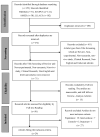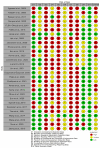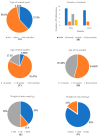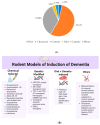Curcumin and Dementia: A Systematic Review of Its Effects on Oxidative Stress and Cognitive Outcomes in Animal Models
- PMID: 40725274
- PMCID: PMC12295257
- DOI: 10.3390/ijms26147026
Curcumin and Dementia: A Systematic Review of Its Effects on Oxidative Stress and Cognitive Outcomes in Animal Models
Abstract
Dementia is marked by progressive cognitive decline linked to oxidative stress, neuroinflammation, and synaptic dysfunction. Curcumin, a natural compound from Curcuma longa, has shown promising neuroprotective effects. This systematic review analyzed 29 preclinical studies using rodent models of dementia induced by chemical, genetic, or dietary methods. The review focused on curcumin's effects on oxidative stress, inflammation, and cognitive outcomes. All studies assessing malondialdehyde (MDA) reported significant reductions, indicating reduced oxidative stress. Superoxide dismutase (SOD) activity increased in all measured cases, while glutathione (GSH) levels rose in about one-third of studies. A literature search was comprehensively conducted using PubMed, Scopus, AMED, and LILACS databases through April 2024. Curcumin also demonstrated anti-inflammatory properties, with over 80% of studies showing reduced levels of pro-inflammatory cytokines such as TNF-α, IL-6, and IL-1β. Additionally, 40% of studies noted increases in anti-inflammatory markers like IL-4 and IGF-1. Cognitive performance improved in around 80% of studies, especially in spatial learning and memory. Some studies also reported behavioral improvements, including reduced anxiety and enhanced locomotion. Curcumin demonstrated potent antioxidative, anti-inflammatory, and cognitive-enhancing effects across diverse dementia models. Its ability to modulate multiple pathological pathways highlights its potential as a bioactive compound for mitigating cognitive decline associated with neurodegenerative diseases. However, variability in study design and curcumin formulations suggests the need for standardized protocols and further high-quality research to facilitate clinical translation.
Keywords: animal models; antioxidant; cognitive function; curcuma longa; curcumin; dementia; neuroinflammation; oxidative stress.
Conflict of interest statement
The authors declare that they have no known competing financial interests or personal relationships that might appear to influence the work reported in this paper.
Figures








References
-
- Warren J., Collinge J., Fox N., Mead S., Mummery C., Rohrer J., Rossor M., Schott J., Weil R. Neurology: A Queen Square Textbook. Wiley Online Library; Hoboken, NJ, USA: 2024. Cognitive impairment and dementia; pp. 319–367. - DOI
-
- Birajdar S.V., Mulchandani M., Mazahir F., Yadav A.K. Nanomedicine-Based Approaches for the Treatment of Dementia. Academic Press; Cambridge, MA, USA: 2023. Dementia and neurodegenerative disorder: An introduction; pp. 1–36. - DOI
-
- Minett T., Brayne C. Oxford Textbook of Cognitive Neurology and Dementia. Oxford Academic Press; Oxford, UK: 2016. Epidemiology of dementia; pp. 211–220.
-
- World Health Organization . Global Status Report on the Public Health Response to Dementia. World Health Organization; Geneva, Switzerland: 2021.
-
- World Health Organization . A Blueprint for Dementia Research. World Health Organization; Geneva, Switzerland: 2022.
Publication types
MeSH terms
Substances
Grants and funding
LinkOut - more resources
Full Text Sources
Medical
Miscellaneous

